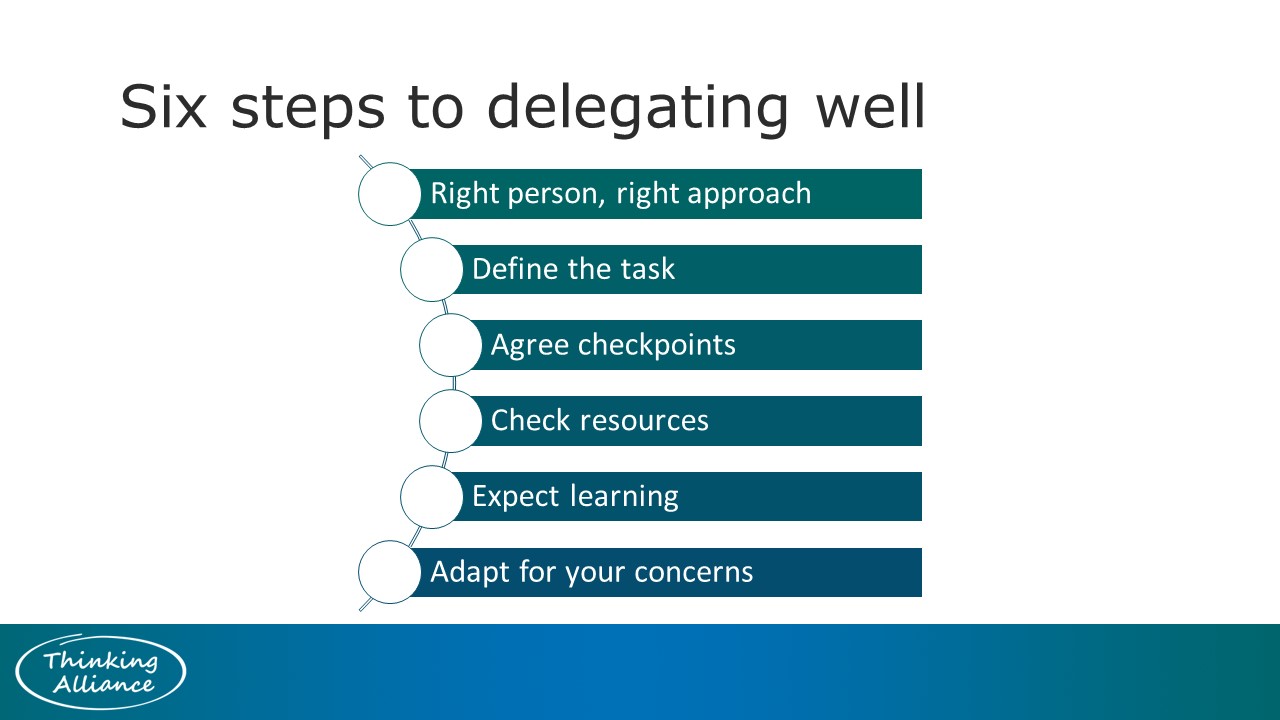
27 Sep How can I delegate better and free up time to think?
One way to clear your decks a little is to delegate more.
Done well, delegation is a win-win-win. You free up time to focus where you can add more value. Your people gain valuable skills and experience and the team becomes more resilient. And your organisation makes better use of its people and work flows more smoothly.
You know this.
Yet, if you’re like most people, you still don’t delegate as much as you could.
There’s work which could go to someone in your team, or sideways to a better-placed colleague, or even upwards to your boss who has the authority to push things ahead. But it’s still sitting on your to-do list, nagging away at your attention, and blocking you from doing something better.
Why? Chances are, it’s linked to one of the following:
- Time – it seems quicker to do it yourself
- Guilt – everyone is already too busy
- Control – you need to know what’s going on
- Fear – you’re worried what might happen if there’s a mistake
- Trust – you don’t feel confident in your team
- Enjoyment – you like the work and don’t want to share it
Sound familiar? Before we dive into some things you can try to tackle the WHY, let’s remind ourselves HOW effective delegation can be done.
- Right person, right approach: ‘Right person’ can mean many things: the right strengths, the right time to give them a new challenge, more available time than the others… And ‘right approach’ reminds you to tailor your request (what you ask, and how you ask it) to the person.
- Define the task: Use the ‘5Ws & H’ question words (Why, What, Where, When, Who and How) to scope all the aspects of the task you’ll need to explain.
- Agree checkpoints: When do you need to see interim stages? Do you need to sign off the work? How can the person check in with you at other points?
- Check resources: where can the person find examples, templates, ‘just in time’ training, people to ask – and can you help them find the time to do it?
- Expect learning: things will go differently to your expectations. Invite thoughts and ideas along the way, capture learning, respond appropriately to errors, and review afterwards.
- Adapt as necessary, especially for what’s holding you back!
So, let’s look at WHY you’re not delegating and what you might do about that.
These tips come from personal experience and many conversations with clients over the years – delegation is a real sticking point for many of us! Some are practical steps, and some are about re-framing your thinking so you can make progress.
- Time: think short term rather than long term, and about investing your time rather than spending it. The sooner you start, the sooner you’ll start to see benefits. Start small, ie quick. And if you’re worried about the time you’ll spend on quality assurance later, set very clear expectations about quality when you define the task.
- Guilt: there’s always too much to do – how can you help everyone prioritise better? Would passing on this task free you up to think ‘upstream’ to save future time and effort for everyone? Can you invite people to offer how/when to pick up tasks (being mindful that not everyone can/will offer, and not to give opportunities only to those who ask for them)
- Control: the higher you go in the organisation, the more impossible it becomes to control things, so start practising letting go now! Close control can increase risk through blindspots, biases or overconfidence, whereas sharing control can yield distributed skill and experience that helps maintain control in rocky times. If you can pinpoint what you really need to know, use that to inform checkpoints and expectations.
- Fear of mistakes: Mistakes are inevitable. Involving more people helps spot things early, broaden the possible responses, and help learning and improvement. Share concerns as you delegate (checkpoints and expectations again) and get ‘cover’ from seniors if you’re trying something very new. You could also work on how you respond productively to different kinds of errors and failures.
- Trust: the more you constrain a team, the less you’ll trust each other. Work on team communications and relationships and invite co-creation of things like desk notes or templates so everyone plays a part in setting and monitoring expectations. Start small if you need to, and invite people to reflect back instructions: ‘so, tell me how you’re going to go about doing this…’
I expect one or two areas will have jumped out at you more than the others. That’s good. The next step is to decide what you’ll do.
Pick one adjustment that appeals and give it a go – not just once but perhaps a handful of times over the next few weeks. The more you practise, the more comfortable you’ll get, and the more you’ll find things moving towards that win-win-win. And the more you’ll get of that precious time to think!

